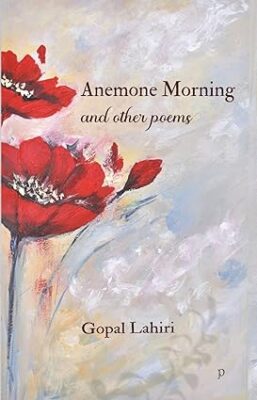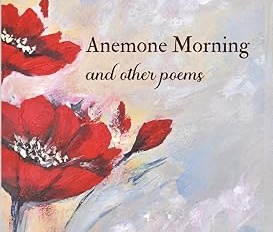
Gopal Lahiri is a bilingual poet, editor, critic, and translator based in Kolkata. Anemone Morning and Other Poems is his latest collection of poetry that is singular in its style, thought, and skill and can stimulate many artistic minds. “This is a collection of meditative, eco-critical, nature, real, and surreal poems. In addition, there are Japanese-form poems, like Gogyoshi, Haiku, Senryu, and Haibun” writes Lahiri. The linchpin of the volume is the stunning imagery which creates a poetic landscape. Lahiri’s work stems from meticulous planning and control over his poetic medium. The volume is neatly divided into four segments—‘Resurrection’, ‘Dreamer’s Search’-Green Path’, ‘Mind’s Eye’, and ‘Miscellany. The title is intriguing. The name ‘Anemone’ comes from the Greek word ánemos, meaning “wind.” It can denote both the wind that helps blow the flowers open and the flower’s fragility and susceptibility to wind. Anemone Morning is the poet’s epiphany akin to the wind which opens his horizon to the fragility, susceptibility of life, and consequent healing.
The opening section of the collection is called ‘Resurrection’ the poet still retains his personhood, or individuality, though the body may or may not be changed. The titular poem ‘Anemone Morning’ sets the tune as he measures his ‘steps near the yellow floral sea’. “The resolutions fade in the rising sun,/ splits me like the flakes of mica schist,/ I carve them in my own image./ Let myself sink deep until I get carried away./ The remnants are here, there, and everywhere”. Each of the poems in this section is individual and together they can be read as a long poem for in each of the poems the same thought of discovering and re-discovering life and its remnants reverberates. The transience, the vagaries of life, the pain, the emptiness, and the joy that life offers at various continued moments are captured. Gopal Lahiri writes, ‘each moment is a pin-hole/ showing me the largest canvas possible’. ‘This is the aha moment-/ time will brim over as easily as a dream,/ then arranges itself during sleep’. The poet marshals a message of compassion and meaning in this seemingly meaningless world.
Nature is another expression of singularity in this volume. There is a constant return to nature in his poetry. Gopal Lahiri has a profound rapport with the natural world. “His images conjure splashes of vivid colour in the world around us, dreams that the limitless sky nurtures, melodies that replenish silent landscapes in poems that are pensive in their meditative appeal’’ writes Bashabi Fraser. ‘Dreamers’ Search—Green Path’ the next segment shows the mirror—the alarming rate at which we are ravaging the earth in the name of modernity is spine-chilling. The poet laments “I am sitting on the sea beach,/ a cigarette butt, torn plastic, package and wrapping,/ We throw it all into the sea–/ paper cup and glass, tin, leather shoes, puddles of oil,/ A dark globe, we will be rotting,/ because that is what we want. The poet touches a raw nerve “This trail, this narrow path, this green belt,/ but something erodes them,/ we can’t trace them back./ Now a metal road, wide, it’s heartless./ we are travelling fast, faster than light,/ Are we? Will we ever be?”
The poet’s unconscious mind guides the readers to reveal imageries of unconventional and singular poetic temperament in the next section—“Mind’s Eye”. In today’s world there seems to be an increasing demand for mindfulness the poems in this section help the readers to reconnect with their authentic selves. Anemone Morning and Other Poems essentially define the journey of the eternal soul from unbalanced existence to consciousness. “The canvas that says stay, says sit, says sleep, / the essence is the same—a moment/ of insouciance amid the turmoil”. Memory adds unobtrusive inputs throughout the poet’s journey—“how to keep track of the days, and nights,/ each one shining, each one alone,/ each one then gone. / the house is quiet because it has to be”(“Homespun”). “Memory is perhaps strong beyond the bone,/ where yellow light meets the red corpuscles ‘ he writes in “Evening in Alpharetta”. In some of the poems like “Queen of Hills”, “Eerie Quiet”, “Shadow Lines” Lahiri struck a melancholic, yet euphoric note that spaces his lines in a way that makes the ends seem incomplete. One of the central themes of the book is the search for meaning and purpose in life. Lahiri encourages readers to introspect and identify their unique purpose, a deeply personal journey that requires self-reflection. The segment“Mind’s Eye” provides readers with a roadmap to living a more meaningful and fulfilled life.
The last section –‘Miscellany’ contains Japanese –form poems which showcases Lahiri’s mastery of the form. “You bring paper, pencil, eraser, book/ on the mahogany table, / the world connects and disconnects,/ that’s how things move around/ so that we can set the tone”. The capricious energy of Gogyoshi, Haiku, Senryu, and Haibun—be it in the various reflections dance with skill or the malleability of the form. The results are images of extraordinary poetic and textural complexity that defy definition like Rorschach’s ink blots. “Secret diary/ inhaling all the/ commas and semicolons”. The beautiful book cover adds to the overall aesthetic experience of the collection. Anemone Morning and Other Poems is here to leave an indelible mark on the minds of the readers.

Sutanuka Ghosh Roy
Dr. Sutanuka Ghosh Roy is an Associate Professor in the Department of English at Tarakeswar Degree College, The University of Burdwan, India. She is a reviewer, a critic, and a poet. The titles of her books are Critical Inquiry: Text, Context, and Perspectives and Commentaries: Elucidating Poetry, Rassundari Dasi’s Amar Jiban: A Comprehensive Study, Asprishya (The Untouchables, a novel by Sharan Kumar Limbale translated into Bengali). Opera is her debutant collection of poetry.

Gopal Lahiri
Gopal Lahiri is a bilingual poet, critic, editor, writer and translator with 30 books published, including eight solo/jointly edited books. His poetry and prose are published across more than one hundred journals and anthologies globally His poems are translated in 18 languages and published in 16 countries. He has been nominated for Pushcart Prize for poetry in 2021. He has received Setu Excellence Award, Pittsburgh, US, in poetry in 2020. He has been conferred First Jayanta Mahapatra National Award on literature in 2024 for his significant contribution in Indian English Writing. His collection of poems ‘Alleys are Filled with Future Alphabets.’ has received Pan Asian Ukiyoto awards.
